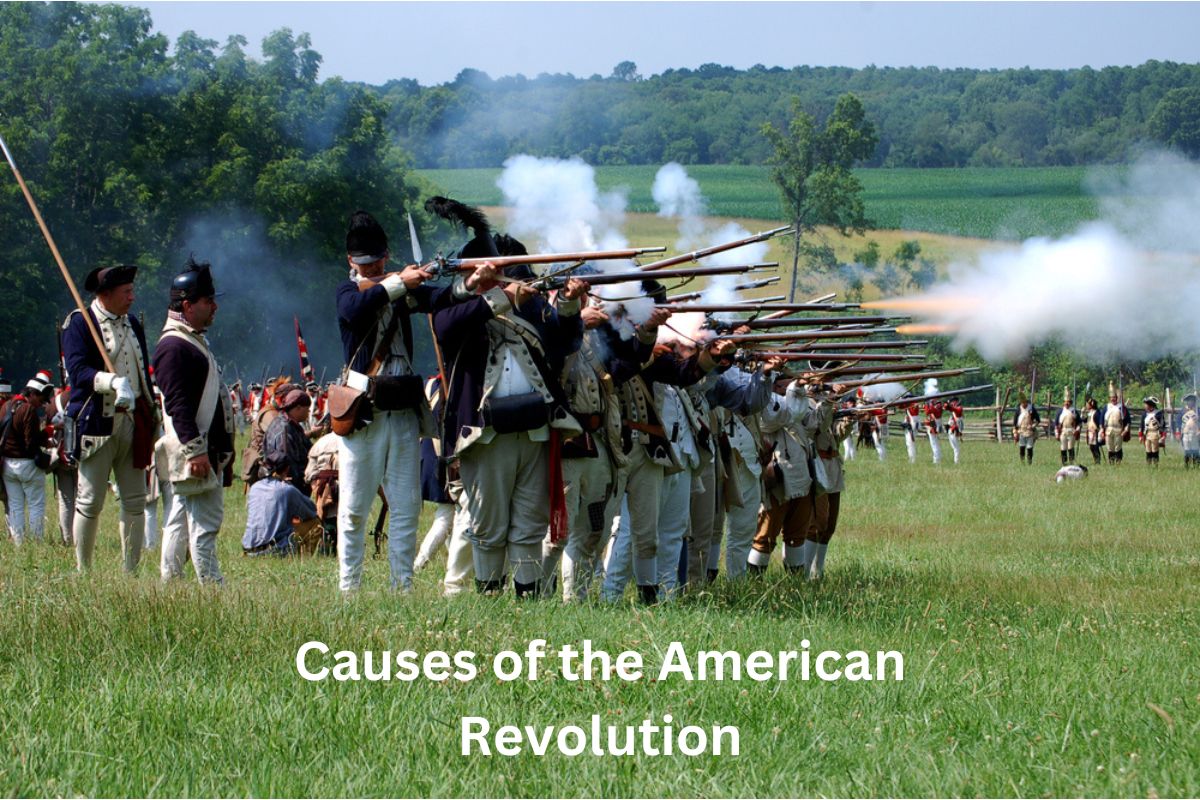The American Revolution was a pivotal moment in world history, marking the beginning of a new era of political and social change. It was a time when a group of British colonies in North America broke away from their imperial rulers and established a new independent nation.
But what were the causes of this momentous event? Why did the colonists decide to rebel against the British Empire?
In this blog post, we will explore the various factors that contributed to the American Revolution, including British colonial policies, colonial responses, Enlightenment ideas, but more importantly key events such as:
- Seven Years War (1756-1763)
- The Boston Massacre (1770)
- The Boston Tea Party (1773)
- Intolerable Acts (1774)
- The First Continental Congress (1774)
- The Second Continental Congress (1775)
- The Declaration of Independence (1776)
By understanding the complex and interconnected factors that led to the American Revolution, we can gain a deeper appreciation of its significance and lasting impact on American history and beyond.
Causes of the American Revolution
1. Seven Years War (1756-1763)
The Seven Years’ War was a global conflict that took place from 1756 to 1763, involving major European powers, their colonies, and various indigenous groups. It was fought primarily between the French and British empires, with both sides seeking to expand their territory and influence around the world.
The conflict began in Europe, with France and Britain competing for dominance on the continent. It quickly spread to the colonies, where both sides sought to gain control of valuable resources such as land, fur, and trade routes.
In North America, the war is known as the French and Indian War and was fought primarily between the French and British colonists and their indigenous allies.
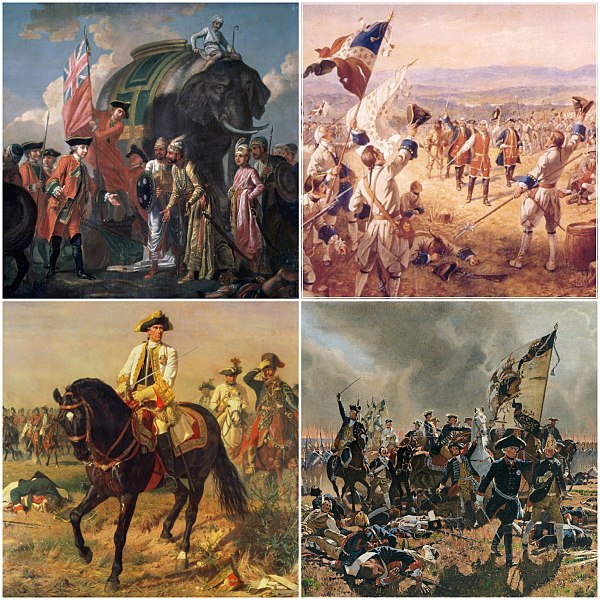
The Seven Years’ War was a brutal conflict that saw significant loss of life and resources on both sides. It was characterized by large-scale battles, sieges, and raids, as well as the use of guerilla tactics by indigenous groups.
The war ended with the Treaty of Paris in 1763, which saw France cede most of its North American colonies to Britain. The treaty also marked the beginning of British dominance in North America and set the stage for further conflicts between Britain and its colonies, including the American Revolution.
The Seven Years’ War had significant political, economic, and social consequences around the world. It helped to shape the modern geopolitical landscape, with the British Empire emerging as a dominant global power.
The war also contributed to rising tensions between Britain and its colonies, as colonists increasingly chafed under British rule and sought greater independence and self-determination.
2. The Boston Massacre (1770)
The Boston Massacre was a pivotal event in the lead up to the American Revolution that occurred on March 5, 1770. It was a violent confrontation between British soldiers and a group of Bostonians that resulted in the death of five colonists.
The events leading up to the Boston Massacre began with growing tensions between British soldiers stationed in Boston and the colonists. The soldiers were seen as oppressive and a symbol of British control, and there were frequent clashes between them and the colonists.
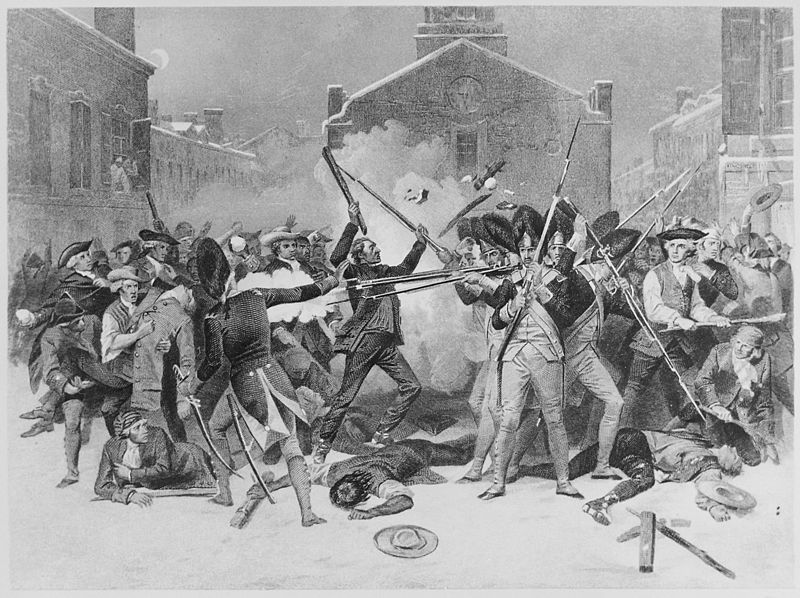
On the evening of March 5, a group of colonists began taunting a British soldier outside the Customs House in Boston. A crowd gathered, and tensions quickly escalated. More British soldiers arrived on the scene, and as the colonists continued to hurl insults and throw objects at them, the soldiers fired into the crowd.
Five colonists were killed and several others were injured in the incident. The Boston Massacre was widely publicized throughout the colonies and was seen as evidence of British oppression and brutality. It helped to galvanize support for the colonists’ cause and further fueled the growing sense of resistance and rebellion against British rule.
The British soldiers involved in the incident were put on trial for murder, and a young lawyer named John Adams defended them in court. Adams argued that the soldiers had acted in self-defense, and all but two were acquitted of the charges.
Overall, the Boston Massacre was a tragic event that highlighted the growing tensions between the colonists and the British and contributed to the sense of unrest that would eventually lead to the American Revolution.
It also helped to illustrate the importance of freedom of speech and the press, as colonial newspapers were able to widely publicize the incident and rally support for the colonists’ cause.
3. The Boston Tea Party (1773)
The Boston Tea Party was a political protest that occurred on December 16, 1773, in Boston, Massachusetts, and is considered one of the key events leading up to the American Revolution.
The protest was against the British Parliament’s Tea Act, which gave the British East India Company a monopoly on tea sales in the colonies and maintained a tax on the commodity.
A group of colonists known as the Sons of Liberty organized the protest, which involved the boarding of three British tea ships in Boston Harbor. The colonists, dressed as Native Americans, proceeded to destroy over 300 chests of tea by throwing them into the harbor.
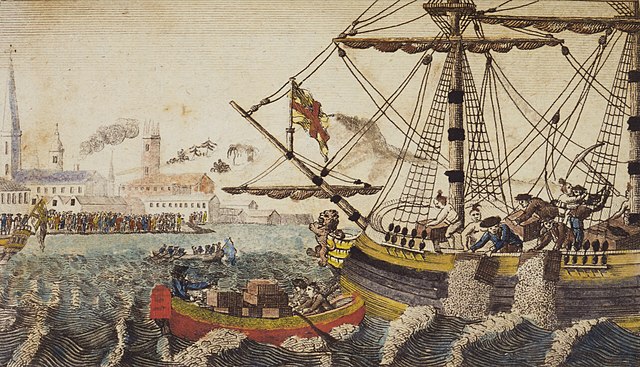
The Boston Tea Party was a significant moment in the colonists’ resistance to British rule. It was a direct challenge to British authority and helped to galvanize support for the colonists’ cause.
The British government responded with harsh measures, including the passage of the Coercive Acts, which closed Boston Harbor and restricted colonial self-government.
It was also significant in that it highlighted the importance of organized resistance and direct action in the colonists’ struggle for independence. It demonstrated the power of collective action and the ability of ordinary people to challenge entrenched power structures.
The Boston Tea Party was a pivotal moment in the lead up to the American Revolution, representing a significant act of resistance against British rule and a demonstration of the colonists’ willingness to fight for their rights and liberties.
4. Intolerable Acts (1774)
The Intolerable Acts were a series of punitive measures passed by the British Parliament in response to the Boston Tea Party and other acts of colonial resistance. The Acts were designed to punish the colonists for their perceived defiance of British authority and to reinforce British control over the colonies.
The Intolerable Acts included several measures that restricted colonial self-government and increased British control over colonial affairs. One of the Acts, the Massachusetts Government Act, suspended the colony’s charter and placed it under direct British control. Another Act, the Quartering Act, required colonists to house and feed British soldiers in their homes.
The Acts also closed Boston Harbor until the colonists paid for the damages caused during the Boston Tea Party and restricted town meetings in Massachusetts.
The Intolerable Acts were widely opposed by the colonists and contributed to the growing sense of rebellion against British rule. The Acts were seen as a direct attack on colonial liberties and rights, and they helped to unify the colonies in their opposition to British authority.
The Acts led to the convening of the First Continental Congress in 1774, where colonial leaders met to discuss a coordinated response to British rule. The Congress issued a Declaration of Rights and Grievances, which asserted the colonists’ rights as British citizens and demanded an end to British interference in colonial affairs.
The Intolerable Acts were a significant moment in the lead up to the American Revolution. They represented a direct challenge to colonial liberties and rights and helped to galvanize support for the colonists’ cause. They also set the stage for further conflict between the colonies and Britain, ultimately leading to the Declaration of Independence and the establishment of a new independent nation.
5. The First Continental Congress (1774)
The First Continental Congress was a meeting of delegates from twelve of the thirteen British North American colonies in response to the Intolerable Acts and other grievances against British rule. The Congress was held from September 5 to October 26, 1774, in Philadelphia, Pennsylvania.
The Congress was convened to discuss a coordinated response to British rule and to address issues such as taxation, trade, and colonial self-government. The delegates were chosen by colonial assemblies and were a mix of political and intellectual leaders from across the colonies.
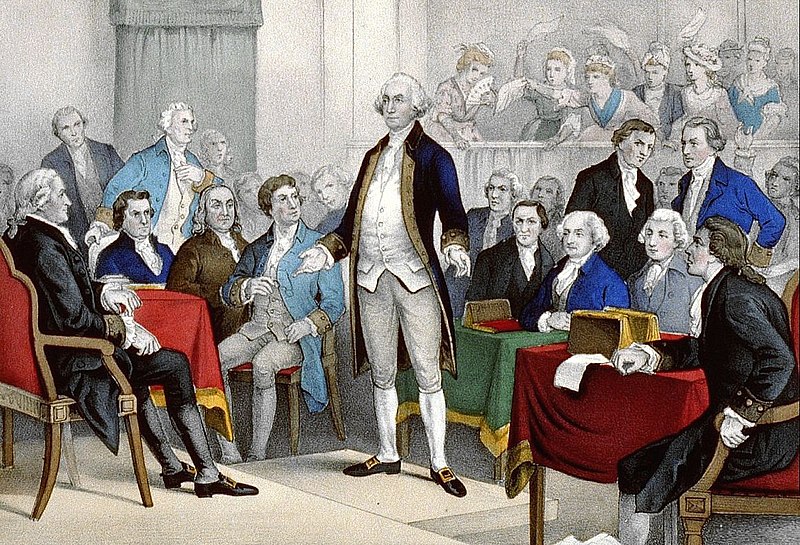
During the Congress, the delegates drafted a Declaration of Rights and Grievances, which asserted the colonists’ rights as British citizens and demanded an end to British interference in colonial affairs.
The Declaration was an early expression of American identity and unity and marked a significant step towards independence from British rule.
The Congress also passed a series of resolutions calling for boycotts of British goods and urging the colonies to form militias to defend themselves against British aggression. These resolutions represented a significant escalation in the colonists’ resistance to British rule and set the stage for further conflict.
The First Continental Congress was a critical moment in the lead up to the American Revolution. It marked the first organized resistance to British rule and helped to unify the colonies in their opposition to British authority. The Congress also represented an early expression of American identity and laid the foundation for the establishment of a new independent nation.
6. The Second Continental Congress (1775)
The Second Continental Congress was a meeting of delegates from the thirteen British North American colonies that took place from May 10, 1775, to March 1, 1781, in Philadelphia, Pennsylvania. The Congress was convened in response to the outbreak of hostilities between the colonies and Britain in the American Revolutionary War.
The Second Continental Congress was tasked with organizing the colonies’ military resistance to British rule. The Congress appointed George Washington as commander-in-chief of the Continental Army and oversaw the colonies’ military strategy throughout the revolution.
During the Congress, significant actions were taken, including the drafting and signing of the Declaration of Independence on July 4, 1776, which formally declared the colonies’ independence from Britain. The Congress also negotiated treaties with foreign powers, including France, which provided critical military and financial support to the American cause.
The Second Continental Congress also established a system of government for the colonies, including the Articles of Confederation, which served as the first governing document of the United States.
The Second Continental Congress was a critical moment in the lead up to the American Revolution. It represented the formal organization of the colonies’ resistance and laid the foundation for the establishment of a new independent nation.
The Congress played a significant role in coordinating military strategy and securing crucial foreign support, ultimately leading to the colonies’ victory over Britain and the establishment of the United States of America.
7. The Declaration of Independence (1776)
The Declaration of Independence was a document adopted by the Second Continental Congress on July 4, 1776, that declared the thirteen American colonies independent from British rule. The document was primarily authored by Thomas Jefferson, although it underwent revisions by other members of the Continental Congress before being formally adopted.
The Declaration of Independence asserted that all individuals are endowed with certain unalienable rights, including life, liberty, and the pursuit of happiness. It also argued that governments derive their authority from the consent of the governed and that when a government becomes destructive of these rights, it is the right of the people to alter or abolish it.
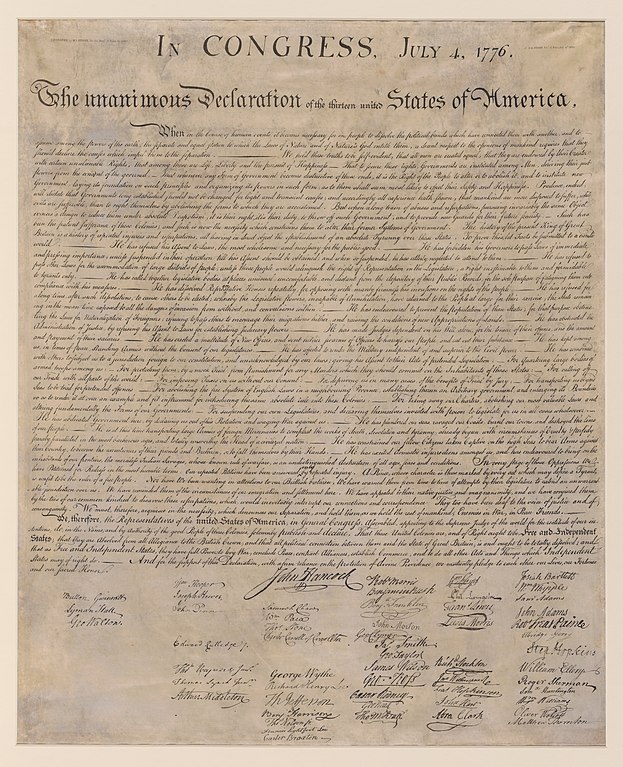
The Declaration of Independence was a significant moment in American history, representing the formal separation of the colonies from Britain and laying the groundwork for the establishment of a new independent nation.
The document was based on Enlightenment ideas and represented a culmination of the colonists’ years of resistance and rebellion against British rule.
The Declaration also had significant global implications, serving as an inspiration for other movements seeking independence and self-determination around the world.
The Declaration of Independence was a critical moment in the lead up to the American Revolution, representing the formal declaration of independence from British rule and laying the foundation for the establishment of a new independent nation based on principles of liberty and democracy. The document remains an enduring symbol of American identity and represents one of the most significant moments in world history.
